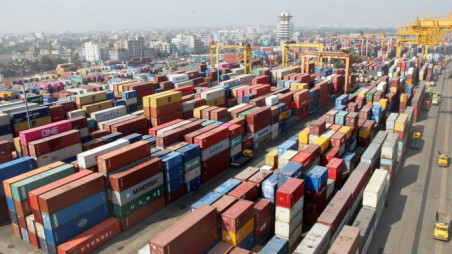From power to ports: Interim govt revives the unsolicited deal playbook
Despite its tough stance on unsolicited power projects, the government appears far more lenient with non-competitive deals in strategic infrastructure like ports and coal supply

HIghlights:
- Three major Chittagong Port terminals to be leased to foreign operators without open tenders.
- First-ever long-term foreign lease of key port infrastructure under Direct Procurement Method.
- Shipping Ministry defends move, citing "no alternative" to boost efficiency and investment.
- Similar no-tender deals in power sector once led to costly contracts and policy backlash.
- Interim government accused of double standards in applying transparency rules.
By the end of this year, three key terminals of the Chittagong Port — Laldia, New Mooring, and Pangaon — are expected to be leased to foreign operators for 25 to 30 years, bypassing open tenders.
Similar non-competitive arrangements are reportedly in the pipeline for the third Floating Storage and Regasification Unit (FSRU) at Moheshkhali, coal supplies for the Matarbari power plant from Indonesia, and new vessels for the Bangladesh Shipping Corporation.
According to the Ministry of Shipping, the agreements for the port terminals are scheduled to be signed in December. This would mark the first time in Bangladesh's history that such critical infrastructure is being leased long-term to foreign entities under the Direct Procurement Method (DPM) — completely sidestepping competitive bidding.
What began as a G2G framework has effectively become a direct handover to private foreign companies, raising questions over transparency, accountability, and value for money.
'No alternative'—a familiar justification
Defending the decision, Shipping Secretary Mohammad Yousuf said at a Dhaka event on 12 October that appointing foreign operators was necessary to improve efficiency and attract investment, as the port's annual container-handling capacity must reach 5.36 million TEUs by 2035. "There is no alternative to hiring foreign operators," he said.
But that "no alternative" argument is not new. It echoes the same justification once used to legitimise bypassing competitive tenders in the power sector — a policy that began as a temporary fix but ended in systemic reliance on unsolicited deals.
A costly legacy in the power sector
When the Quick Enhancement of Electricity and Energy Supply (Special Provisions) Act, 2010 was enacted, the Awami League government argued it was essential to tackle the acute power crisis. The law allowed the government to sign power generation deals without tenders — drawing both local and foreign private producers.
Though the act was intended as an emergency measure, it was extended several times, most recently in 2021, and became the foundation for an era of unsolicited contracts.
Following the fall of the AL regime in August 2024, the Centre for Policy Dialogue (CPD) urged repeal of the law to restore competition and address procurement irregularities. Within three months, the interim government scrapped the act but said existing contracts would remain valid.
The Bangladesh Power Development Board (BPDB) subsequently cancelled 31 renewable energy projects approved under that act — projects that would have generated 3,287MW of green electricity with $6 billion in proposed investments. Several investors, including from China, Japan, Singapore, the UAE, France, Germany and the US, had already purchased land and spent around $300 million before being abruptly dropped.
Although the High Court later condoned the past actions under the act and kept a review option open, BPDB stuck to its decision and launched fresh tenders. Officials say the open competition brought down average tariffs to 8.27 cents per unit — 21% lower than previous unsolicited deals — thanks also to falling global solar panel prices.
However, the tendering process for 55 grid-connected solar plants (5,238MW) has been slow, and no deals have been finalised yet. Officials hope to conclude the process by December. Had the previous projects been allowed to continue under court protection, some could have already begun generating power by now, potentially reducing fuel imports and emissions.
The interim government has also announced reviews of all fossil fuel-based independent power producer (IPP) contracts signed without tenders, citing "inconsistencies." This has unsettled private power producers, who warn that unilateral action could discourage future investment.
Double standards in procurement
Despite its tough stance on unsolicited power projects, the government appears far more lenient with non-competitive G2G deals in strategic infrastructure like ports and coal supply. A fresh G2G arrangement is reportedly being considered with Indonesia for coal imports after a private consortium failed to deliver satisfactory supplies.
This contradiction is stark. Renewable projects were scrapped for lacking transparency, yet major port and energy projects are advancing under similar non-competitive frameworks. The message, critics say, is unmistakable: open tender rules are being selectively applied.
For an interim administration seeking legitimacy, this selective approach carries risk. G2G deals can strengthen diplomatic ties or secure foreign financing, but without transparency and oversight, they erode public trust, fiscal discipline, and the credibility of reform promises.
When G2G deals make sense — and when they don't
Former CPTU Director General and PPR 2025 Working Group member Md. Faruque Hossain told The Business Standard that direct contracts or G2G procurements are permitted under the Public Procurement Rules when one government assists another or its nominated agency through mutual agreement.
However, he stressed that "negotiation is mandatory in direct contracting, and the contract value must be benchmarked against a properly prepared cost estimate." If that benchmark is flawed, he warned, "the outcome can be distorted — and the contract may be signed at an inflated price."
"Transparency is always lower, and the risk of corruption higher, in direct contracting," he added. "That is why competitive methods are recommended wherever possible."
Procurement rules are designed to ensure value for money through competition, though flexibility exists for emergencies or priority projects. The challenge lies in how prudently those exceptions are applied — and whether they truly serve the public interest.



 Keep updated, follow The Business Standard's Google news channel
Keep updated, follow The Business Standard's Google news channel


















